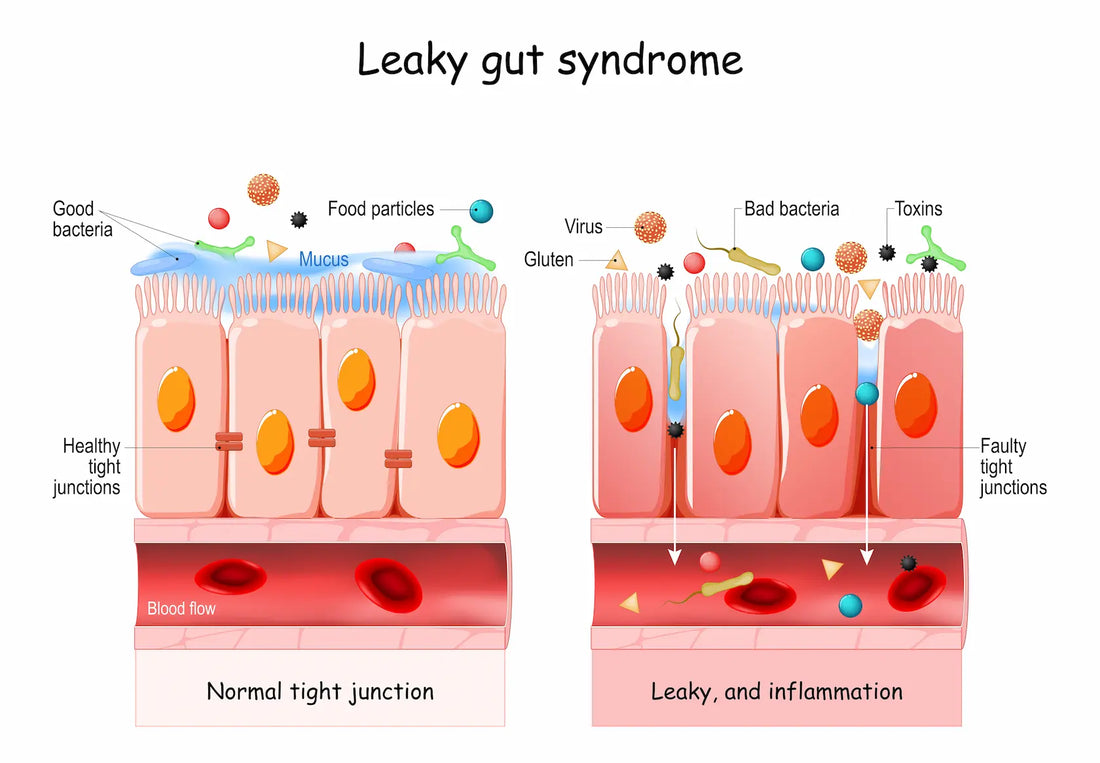Reviewed by Dr Marion Leclerc, PhD, HDR
If you've heard the term "leaky gut," you may not fully understand what it means, but you're probably aware that it's associated with compromised intestinal health. Persistent bloating, gas, and indigestion may be symptoms of an unhealthy diet, food intolerance, or even a leaky gut.
In this blog, we discuss leaky gut, what we can do to promote a healthy digestive system, and how to build a solid foundation for optimal health and well-being.
The Digestive System
It may be wise if we review the anatomy and physiology of the gastrointestinal (GI) tract, especially since we will be discussing leaky gut and digestive issues.
First, the digestive system is made up of organs that are part of your gastrointestinal tract and biliary tract (your liver, pancreas, and gallbladder).1 Together they work to ensure proper digestion, movement of food through the GI tract, absorption of water and nutrients, and excretion of waste.
So let's now focus on the gastrointestinal tract and how it carries out digestion as well as supports and protects us from harmful materials and the environment.
The Gastrointestinal (GI) Tract
The gastrointestinal tract includes the mouth, esophagus, small intestine, and large intestine. The digestive process begins in the mouth and ends in the large intestine.
Digestion
Saliva helps prepare the body for digestion. After food is chewed into smaller pieces and mixed with saliva and salivary enzymes, it forms a food bolus. This bolus then travels through the esophagus to the stomach for further digestion. The stomach holds the food and, with its very acidic pH and enzymes, processes it down to a liquid or paste. It then passes through the small intestine.1
The small intestine breaks food particles down further and absorbs nutrients from this mixture, moving it then to the large intestine or colon. As you remember from the previous blog, the colon is where our beneficial microbes and probiotics are located and active. The large intestine continues the digestion process and breaks down indigestible fiber to move it through the intestines, absorbs remaining nutrients and water, and then the waste is eliminated.2
This is a pretty complex and impressive system that facilitates all these mechanical and chemical processes for digestion and absorption of nutrients, as well as ensuring that harmful waste material safely leaves the body. Also, the role of the gut in creating and maintaining intestinal barrier integrity is another important area we will delve into next.
Protection
Our gastrointestinal tract is lined with millions of cells that allow certain materials like fluids and nutrients to enter the gut to be absorbed and therefore used by the body, while keeping other substances out. You can picture it as a fence with a gate function which controls what is getting through: our gut has semi-permeable or selectively permeable cells found in the intestinal lining that regulate what passes in and out of it. The role of these cells is to prevent harmful substances like undigested food particles, pathogens, or toxins from the environment from entering the gut or the bloodstream. They do this by forming and maintaining a tight barrier or what scientists call 'tight junctions' to protect the host.3
What Is Leaky Gut?
When the intestinal epithelial lining becomes increasingly permeable and can no longer adequately protect the host from dangerous toxins it can lead to a leaky gut which can potentially cause a number of symptoms and chronic conditions.4,5,6 Because of this damaged intestinal lining, harmful substances such as undigested food particles, pathogens, and environmental toxins can leak into the bloodstream and the lymphatic system. This may result in symptoms like gas bloating, food sensitivities, and other symptoms.4,5 This permeable intestinal barrier may also allow bacteria found in our gut to pass through, which could be dangerous.5
Potential Causes of Leaky Gut
Numerous factors, including genetics, poor dietary intake, alcohol consumption, sleep habits, stress, and some medications might affect the integrity of our intestinal barrier.7
Harvard Health reports that genetics is one of the key risk factors for developing a leaky gut. Some people are predisposed to developing this condition because they were born with a weak intestinal barrier.3
Over time, inadequate dietary intake may also lead to the degradation of the intestinal lining, particularly if the diet is poor in dietary fiber, high in refined sugar, and high in fats, including saturated fats.3 Some studies have shown that consuming high-fat diets may have a detrimental effect on the mucosal cells' tight junctions.8
On the other hand, diets that are high in dietary fiber are beneficial for gut microbiota, supporting postbiotics like butyrate, which may support the gut microbiome and gut health.
There is growing evidence that the gut microbiota is essential for maintaining and supporting the intestinal epithelial barrier. Probiotics may help maintain a healthy gut environment by increasing the production of tight junction proteins, though additional long-term research is still required.
Potential Ways to Support a Healthy Gut
Akkermansia Muciniphila. Because the gut microbiome is closely connected to the integrity of the gut, Akkermansia muciniphila plays an integral role in maintaining a healthy gut barrier. One of the main functions of Akkermansia muciniphila is that it contributes to the maintenance of a healthy gut barrier.9 Akkermansia muciniphila regulates the passage of what passes in and out of the body and therefore supports a healthy gut and a healthy immune response.*
You may want to speak to your healthcare provider (HCP) about using Akkermansia MucT™ to help replenish the mucus in your gut barrier which may help to protect you against a leaky gut and regulate the inflammatory response.
Glutamine. L-glutamine is an amino acid that is abundant in the body and may support intestinal integrity by improving the intestine's protective mucosal lining. Research evidence suggests that glutamine maintains the intestinal barrier. Glutamine is also known to be the preferred fuel for intestinal cells like enterocytes and colonocytes and is also considered an important nutrient for healing leaky gut syndrome.10
Avoid ultra-processed foods. You may support a healthy intestinal barrier by avoiding the consumption of ultra-processed foods such as candy, soda, energy drinks, chips and other conveniently prepared foods. These foods are high in fat, sugar, and sodium, and have added artificial preservatives and coloring.6
Avoid refined oils. Stay clear of refined plant oils such as canola, sunflower, soybean, and safflower oils.6 Add healthy oil to your diet in moderation such as extra virgin olive oil.
Say no to non-nutritive sweeteners. Be sure to ditch artificial sweeteners like aspartame, sucralose, and saccharin, as well as any beverages or foods that contain them, from your diet.6
Manage daily stress. Taking a walk or doing some deep breathing may help you to manage those feelings of the daily pressure at home or in the office. Be mindful of taking time to remove yourself from stressful situations when possible. Though we cannot dodge stress entirely, we can learn to prioritize our health and learn to manage our reactions to certain situations/triggers.
Takeaways
First, as you know, it is important to understand your health history to understand best what might be impacting your health. Being able to discuss with your healthcare practitioner to describe exactly what you are experiencing and coupling this with sound information from your medical history is an excellent place to start.
Being mindful of what you eat may serve you well. A food, fluid, and mood journal with times and details will help you track and create awareness of how you tolerate a particular food and even what may trigger stressful situations for you.
Pasteurized Akkermansia MucT™ is more stable than live Akkermansia muciniphila, allowing it to reach your small intestine and colon in order to help protect your gut barrier.* So, why not talk to your HCP to see if this supplement would be something you can add to your daily regimen?
*These statements have not been evaluated by the Food and Drug Administration. This product is not intended to diagnose, treat, cure or prevent any disease.
References
- "Digestive System." Cleveland Clinic, 29 Oct. 2024, my.clevelandclinic.org/health/body/7041-digestive-system. Accessed 28 October 2024.
- Suzanne Dixon MPH, RD. "How The Large Intestine Functions and Keeps You Healthy." Verywell Health, 5 June 2024, www.verywellhealth.com/large-intestine-797216. Accessed 28 October 2024.
- Harvard Health. "Putting a Stop to Leaky Gut." Harvard Health, 21 Nov. 2018, www.health.harvard.edu/blog/putting-a-stop-to-leaky-gut-2018111815289. Accessed 28 October 2024.
- Martini, Eva, et al. "Mend Your Fences." Cellular and Molecular Gastroenterology and Hepatology, vol. 4, no. 1, Mar. 2017, pp. 33–46. https://doi.org/10.1016/j.jcmgh.2017.03.007. https://pubmed.ncbi.nlm.nih.gov/28560287/.
- Mu, Qinghui, et al. "Leaky Gut as a Danger Signal for Autoimmune Diseases." Frontiers in Immunology, vol. 8, May 2017, https://doi.org/10.3389/fimmu.2017.00598.
- Ryan Raman MS, RD. "The Leaky Gut Diet Plan: What to Eat, What to Avoid." Healthline, 17 Mar. 2023, www.healthline.com/nutrition/leaky-gut-diet#causes. Accessed 28 October 2024.
- Eske, Jamie. What to Know About Leaky Gut Syndrome. 13 Feb. 2024, www.medicalnewstoday.com/articles/326117#causes-and-risk-factors. Accessed 28 October 2024.
- Usuda, Haruki et al. "Leaky Gut: Effect of Dietary Fiber and Fats on Microbiome and Intestinal Barrier." International journal of molecular sciences vol. 22,14 7613. 16 Jul. 2021, doi:10.3390/ijms22147613. https://pmc.ncbi.nlm.nih.gov/articles/PMC5440529/.
- Ashrafian, Fatemeh, et al. "Comparative Effects of Alive and Pasteurized Akkermansia Muciniphila on Normal Diet-fed Mice." Scientific Reports, vol. 11, no. 1, Sept. 2021, https://doi.org/10.1038/s41598-021-95738-5.
- Rao, RadhaKrishna, and Geetha Samak. "Role of Glutamine in Protection of Intestinal Epithelial Tight Junctions." Journal of epithelial biology & pharmacology vol. 5,Suppl 1-M7 (2012): 47-54. doi:10.2174/1875044301205010047. https://pmc.ncbi.nlm.nih.gov/articles/PMC4369670/.




